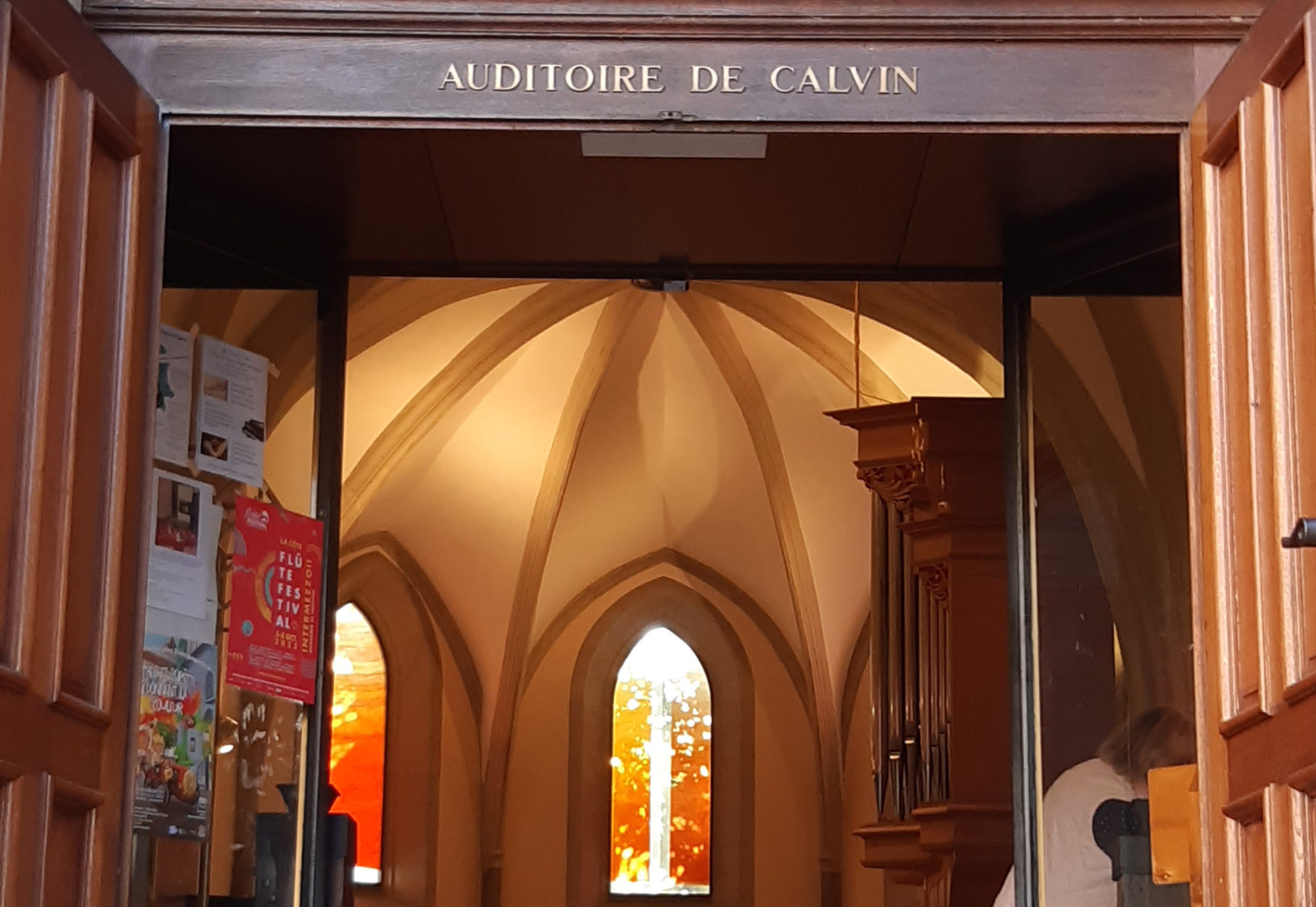Thirteenth Sunday after Pentecost
Deuteronomy 30:15–20; Psalm 1 (sung); Luke 14:25–33
Church of Scotland, Geneva, Auditoire de Calvin, September 7 2025
Robert Redford leaves the office to pick up lunch for his six colleagues, but when he gets back, he finds that everyone has been shot dead.
So begins Three Days of the Condor, a CIA-related thriller now half a century old. In the rest of the film, Redford evades the shooters, who are still trying to kill him. He figures out what’s going on, with a little help from Faye Dunnaway. In the final scene, he gives the story to the New York Times.[1]
It’s a story that begins with death and ends in a minor victory.
Of course, this is the New York Times that four years earlier broke the story of the Pentagon Papers, the sad and sordid story of the United States’ war against Vietnam, which killed 56,000 Americans and over two million Vietnamese.
It’s not the Israeli and American propaganda sheet that the Times has now become.
*
The three days of Easter are also a story that begins with death and ends in victory.
Ordinary political and religious leaders – compromised Jewish priests and a cruel Roman procurator – just happen to have the fate of the world in their hands. Like ordinary political and religious leaders in every age and time, they drop it. They kill the one sent by God to lead us back to God.
Day one. Good Friday.
As we recall it, Day two – Holy Saturday – is for us a day of waiting, a day of expectation. But we have the advantage of living after Easter.
For those who put their trust in Jesus back then, it was a day of desolation. Says Cleopas on the road to Emmaus, “We had hoped that he was the one to redeem Israel.” Obviously we were wrong. And now we are completely lost.
But God does not leave us to be lost, nor does he suffer his beloved Son to see corruption.
Easter Day does not reverse Good Friday. Jesus of Nazareth is forever the one who died on a Roman cross.[2] But Easter Day trumps Good Friday. God raises Jesus from the dead. The Father leads the Word incarnate beyond the cross into new and eternal life. And the risen Christ invites us, as he invited Cleopas and his companion, to share that new life.
*
All that God wants for us is that we should be ourselves – fully human, caring for one another, and caring for the earth that is our common human home.
“Choose life!” says Moses to the Israelites. “Choose life!” says God to all of us.
Evidently, what God wants isn’t what God gets – at least, not yet.
As Mark reminded us two Sundays ago, we live in a world of wars and rumours of wars.
Nearly two years into the state of Israel’s genocide in Gaza, Israel continues, day by day, to bomb and shell, starve and kill; while Western leaders and Arab rulers wring their hands but do nothing to stop it.
In the new film, A House of Dynamite, Kathryn Bigelow tells the story of a nuclear missile set to explode over Chicago and reopens a subject we all tacitly agree not to imagine or discuss, in the movies or anywhere else: the threat of nuclear war that still hangs over all our heads.[3]
And as global warming sails towards 1.5°C, the White House is yet again occupied by a man who thinks, or claims to think, that climate change is a hoax.
*
All our pictures of God are just that: pictures. But some pictures are less helpful than others. Seventeen times scripture speaks of God acting with a mighty hand and an outstretched arm. And when we look at the state of our world, we may well find ourselves wishing that God would come crashing down with a mighty hand on all in high places who are doing so much harm.
But God doesn’t do that.
God’s strategy is more like jujitsu: turning the strength of the wicked against themselves.
God sends us his Son to show us what God is like. This vulnerable Son creates a movement, equally vulnerable, to witness to him and to carry forward his life and work. And he gives us the Spirit – the love of God poured into our hearts – to help us do that.
If we look at Christian history, if we look at our own lives, we have to confess that we don’t always do so well.
But that’s God’s plan: Egregious power and outrageous violence challenged by vulnerable love.
*
In today’s Gospel, Jesus tells the large crowds that are following him, “Whoever comes to me and does not hate father and mother, wife and children, brothers and sisters, yes, and even life itself, cannot be my disciple. Whoever does not carry the cross and follow me cannot be my disciple… None of you can become my disciple if you do not give up all your possessions.”
This is where we wonder uneasily if we shouldn’t sneak out of church. These are hard sayings!
The first thing to notice is that we are still on the way to Jerusalem. In Jerusalem, Jesus will be killed, like many an innocent man before or after him. This tends to concentrate the mind.
The second thing to notice is that Jesus is a Jew and speaks like a Jew. “Not that, but this” is a typically Jewish way of saying, “This is vastly more important than that.”
We misunderstand Jesus if we take him to be saying that we must sell all we have and give to the poor and come follow him. That was a particular challenge addressed to a rich young man in first-century Palestine; and it can be a challenge addressed to particular people ever since. As Francis of Assisi understood it, it was a challenge addressed to him. But it is not addressed to all.
We misunderstand Jesus if we think that he really wants us to hate “father and mother, wife and children, brothers and sisters, yes, and even life itself.” – although, of course, we sometimes, to our destruction, do just that. What Jesus is saying is that we need to get our priorities straight.
He told us this already, two chapters earlier in Luke, in the sermon on the plain. “Seek first God’s kingdom, and everything else will fall into place.”
What Jesus demands, says Fred Craddock, is that following him and trusting in God should take precedence over the many other loyalties with which we live and should redefine them.[4]
First things first.
*
In 1553, Thomas Cranmer wrote: “Our Lord Jesus Christ hath knit together a company of new people with sacraments.”[5]
In Christ, we are new people. In baptism, we die with Christ and are raised to new life in the Spirit. In the Lord’s supper, we are given food for the journey and united with Christ and with one another.
In the Western Catholic church in the late Middle Ages, the Mass was something the priest celebrated. He stood at one end of the church, with his back to the people, mumbling inaudibly in a language most of them did not understand; while the people stood afar off, engrossed in their private devotions, thinking of lunch, or coveting their neighbour’s wife.
The Reformers of the 16th century told us that this was all wrong. The Lord’s Supper is not celebrated by the minister who presides at the sacrament. Nor is it celebrated by those who sit at the top table. It is the worship of the whole congregation, and it is celebrated by us all. It is our common meal that joins us in communion with God and in community with one another and the whole of Christ’s church.
It makes us a congregation of the faithful, united in caring for one another. And it makes us a movement sent into the world to work for God’s kingdom: a movement that works with God to change the world for good.
In Christ, we are new people, working for a new world.
[1] Roger Ebert, “Three Days of the Condor”; Wikipedia, “Three Days of the Condor”
[2] “Jesus never recovers from his death.” Hubert J Richards, The First Easter: What Really Happened (London & Oxford: Mowbray, 1976), 119. Richards adds: “Jesus died into that mystery we call God, in such a way that his presence and his influence are no longer limited to the streets of Jerusalem or the lanes of Galilee.”
[3] Glenn Kenny, “A House of Dynamite”; Nadia Khomami, “Going nuclear”; Peter Bradshaw, “Kathryn Bigelow’s nuclear endgame thriller is a terrifying, white-knuckle comeback”
[4] Fred B Craddock, Luke: Interpretation, a Bible commentary for teaching and preaching (Westminster John Knox Press, 1990), 181f. “To hate is a Semitic expression meaning to turn away from, to detach oneself from.”
[5] Oliver O’Donovan, On the Thirty Nine Articles: A Conversation with Tudor Christianity (Exeter: The Paternoster Press, 1986), 128; 135–155

